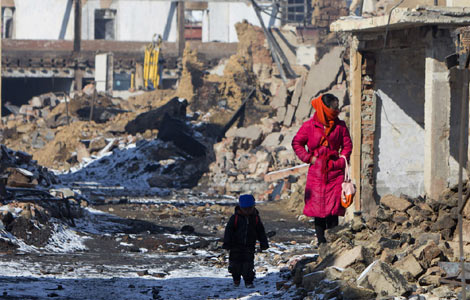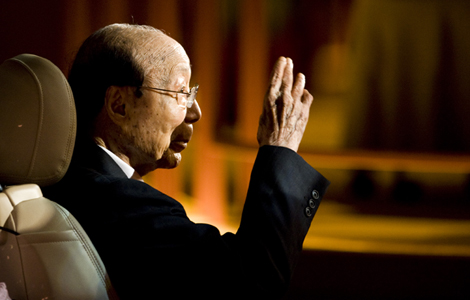A leader like Sharon
Updated: 2014-01-15 08:00
(China Daily)
|
|||||||||||
The former Israeli prime minister and general Ariel Sharon died on Saturday after eight years in a coma. Bestriding his country's history for more than 50 years, Sharon divided opinion as to whether he was a hero or butcher, a ruthless "bulldozer" or peace dove. In the eyes of Israelis, Sharon was a distinguished military leader, despite his campaign fundraising and bribery scandals. But he was loathed by Palestinians who held him responsible for the massacres in the Beirut refugee camps in 1982. However, as a Jordanian political analyst said eight years ago, perhaps no Israeli political figure has acted as decisively as Sharon when it comes to peacemaking, says an article in Xinhua Daily Telegraph. Excerpts:
The Israeli-Palestinian peace process has repeatedly renewed hope and then ended up as a disappointment. It has drained the faith and ideals of generations of Israelis and Palestinians. The crux of the problem is too many "principles" that seemingly cannot to be compromised, that Jerusalem cannot be split, that Israeli settlement building must continue, that there is no way for Palestinian refugees to return homes.
Peace talks cannot move ahead without concessions. What is unique and special about Sharon is that he was willing to break principles if necessary for the sake of peace. He was not bound by religion, law, military order or commitments, or even what he said an hour ago. He adapted to the times and the latest development to maximize the interests of Israel.
What he did in his later years surprised the world. Sharon marched to his own drum and oversaw Israel's unilateral withdrawal from the Gaza Strip. The pullout provoked divisions within Israeli society, and for any Israeli leader, whether left-wing or right-wing, such a decision was courageous and bound to be fiercely contested, threatening to end one's political career. But Sharon's bold act freed Israelis from the moral burden of occupation, and since the Israeli withdrawal, Palestine has completed administrative authority in the area. Ironically, it is the notorious "butcher" that delivered a ray of hope for the Israel-Palestine peace process.
Sharon suffered a stroke only four months later and was in coma ever since, leaving his peacemaking plan incomplete. He died leaving behind a controversial political heritage. A leader like Sharon is still very much needed in the Israel-Palestine peace process, as so far there has been no such worthy successor.
Related Stories
Sharon funeral reflects conflicting views 2014-01-14 07:42
World leaders mourn former Israeli PM Sharon 2014-01-13 20:51
Israelis mourn ex-PM Sharon 2014-01-13 08:57
Israel boosts security for Sharon funeral 2014-01-13 10:33
Today's Top News
At least 16 dead in E China factory fire
Hollande responds to affairs reports
Li offers Bulgaria help with big projects
Xi calls for reform to fight graft
China, Italy agree to boost co-op
S. China Sea rules no threat to peace
Park urges Japan to face history
Man says loss of face pushed him to kill six
Hot Topics
Lunar probe , China growth forecasts, Emission rules get tougher, China seen through 'colored lens', International board,
Editor's Picks

|

|

|

|

|

|





